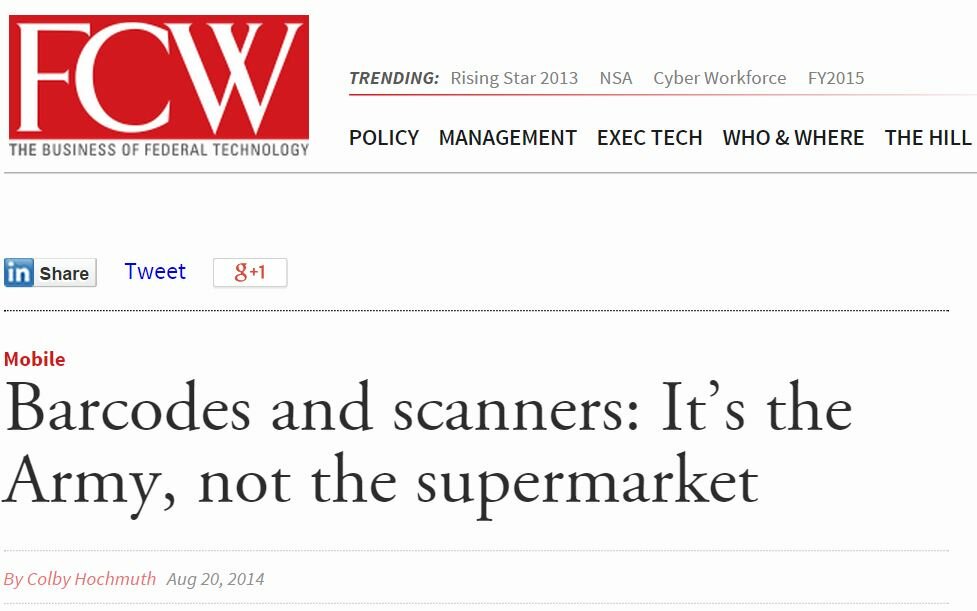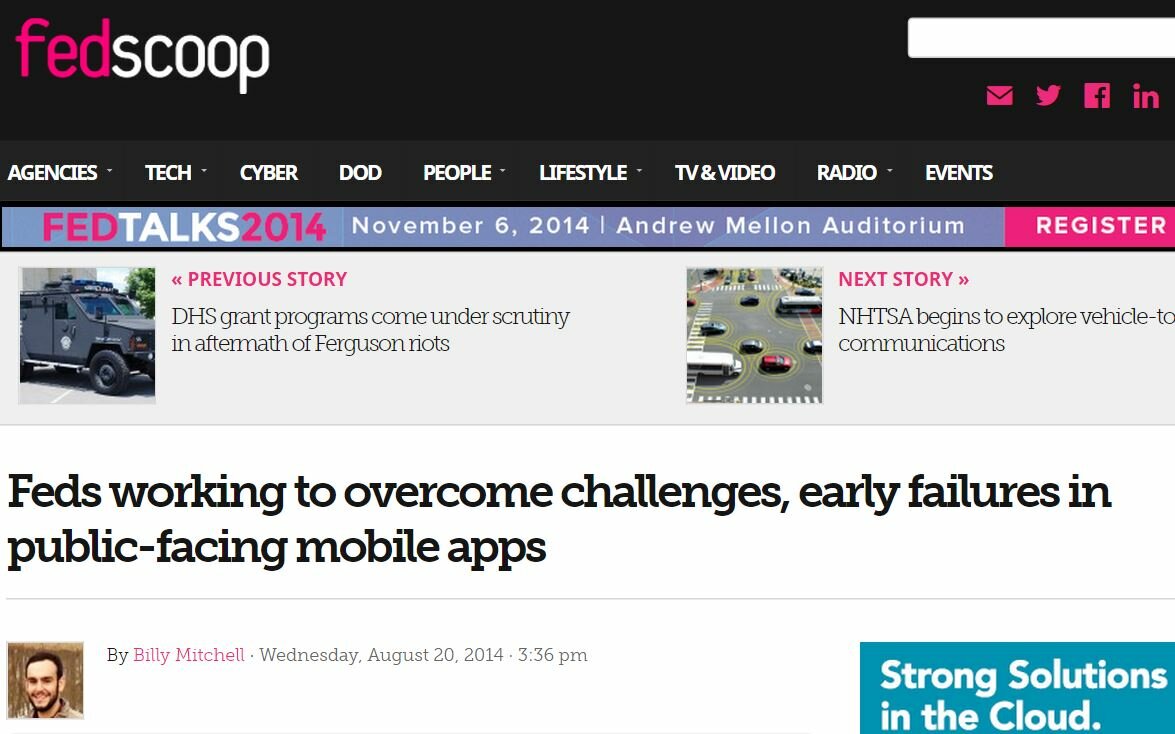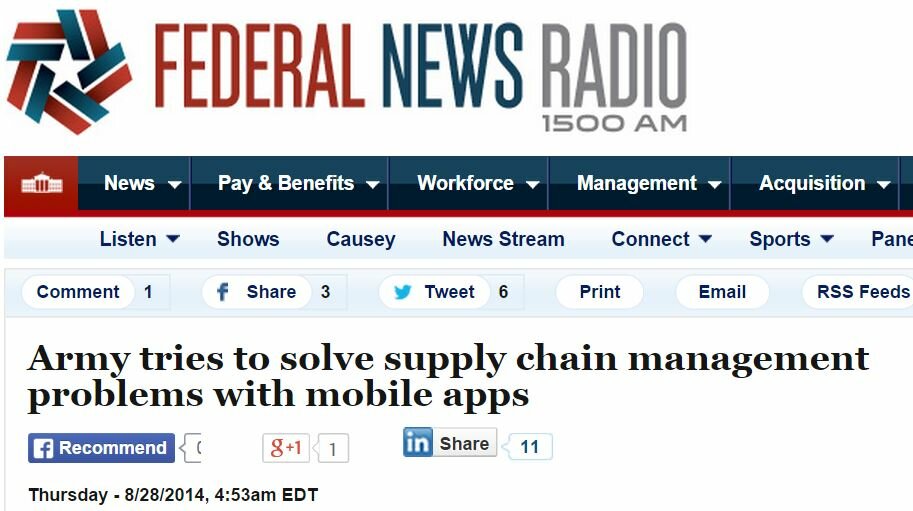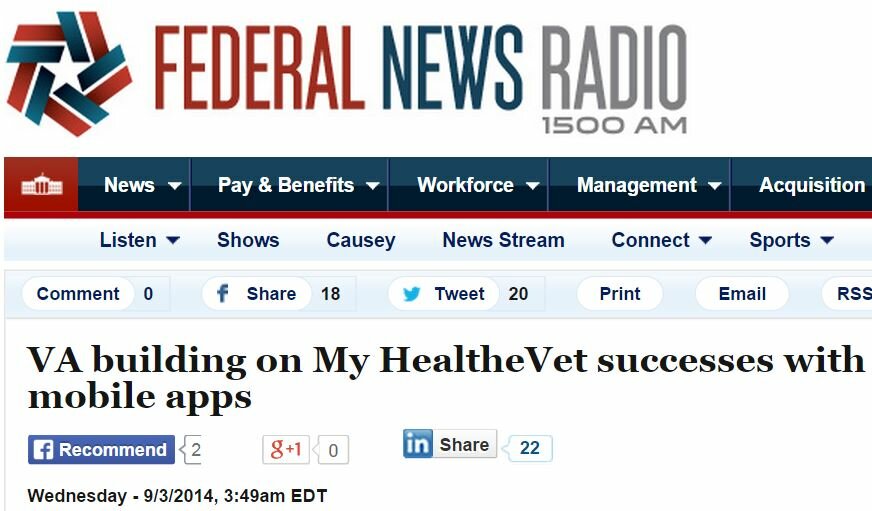August 19-20, 2014 | Ronald Reagan Building | Washington, DC
The Federal Mobile Computing Summit: Enhancing the Mission with Mobility was held on August 19-20, 2014 at the Ronald Reagan Building and International Trade Center in Washington, D.C. Below is media coverage from the event.

Agency mobility efforts would benefit from shared models and templates that are approved and endorsed by the federal chief information officer and CIO council, according to a whitepaper published by the MITRE Corporation and the Advanced Technology Academic Research Center.
Based on discussions that took place at the August 2014 Federal Mobile Computing Summit, the report draws out specific needs of the federal IT community; among them, common license templates for mobile apps and a common security model for wearable devices. (Full story)

The National Security Agency is disbanding its mobility mission management office. The 3-year-old office is going away not because it failed, but rather it was too successful.
Mark Althouse, the outgoing technical director of NSA’s Mobility Mission Management Office, said over the last three years, the organization has focused on integrating mobility and security into back-end and programmatic apps.
“The organization was a matrixed organization within Information Assurance Directorate, was stood up to get us on the right track on that, and we recently stood down that organization and baked that whole mobile mission across that IAD mission,” Althouse said at the Federal Mobile Computing Summit. (Full story)

Protecting some of the most personally sensitive information for the most security-conscious government agencies is no small task, and a panel of government healthcare experts said their primary challenge is to balance security with the ease of use that mobility brings.
In the planning phase for new programs, Neil Evans, codirector for connected health at the Veterans Health Administration, said at the Federal Mobile Computing Summit that his agency addresses security first. (Full story)

As director of integration improvement initiatives in the deputy chief of staff’s office, Army Col. Jack Wayman has been paying a lot of attention to how improving scanning applications on mobile devices can simplify the daily routine of soldiers in the field.
Mobile applications for data collection can reduce error rates and costs, and improve processes for tasks involving products, inventory and paperwork that are common for many soldiers, Wayman said in a panel discussion at the Federal Mobile Computing Summit in Washington, D.C., on Aug. 20. (Full story)

As agencies continually release public-facing mobile apps to better serve American citizens, the directors and strategists behind their creation are the first to admit there is room for improvement.
“In my world, smartphone apps have failed. They have not lived up to their potential. And the reason for that is they’re easy to ignore, and they’re easy to delete,” said Erik Augustson, director of SmokeFree.gov with the National Cancer Institute, in reference to apps he’s worked with that use technologies to deliver behavioral interventions.
Despite an abundance of smartphone-wielding Americans, Augustson and his colleagues speaking at a panel during the Federal Mobile Computing Summit said they still struggle with user experience building mobile applications — that is, creating an app that is useful to a given audience. (Full story)

Mobile device use is growing rapidly across the federal government. Still, the lack of overriding strategy and communications between stakeholders is slowing its development, says a federal official.
Although mobility is one of the fastest growing technology environments in government, there is no government-wide policy overseeing its use and management, said Greg Youst, chief mobility engineer for the Defense Information Systems Agency (DISA) at the recent Federal Mobile Computing Summit in Washington D.C. (Full story)

The Army believes it has an answer to a 24-year-old problem all of the Defense Department has been facing. The Army is about to launch several apps intended to replace a supply chain management process that relies on proprietary handheld scanners, which cost about $2,000 each.
“The way we’re doing it now would cost us about $68 million in labor and material, and we developed a process to reduce that down to about $48,000,” {Col. Jack} Wayman told an audience at the Federal Mobile Computing Summit in Washington last week. “We developed an app to help solders follow a verbally-directed, checklist-driven process to collect simple data, either with barcode scanning or with embedded speech recognition or keypad entry. It includes a verbal readback to the soldier or a keypad confirmation.” (Full story)

Veterans soon will be able to pull up their medical records on their smartphones or tablet computers. The Veterans Affairs Department will launch several mobile applications in the coming months to further the use of telehealth at its facilities across the country.
Dr. Neil Evans, the co-director of Connected Health at the Veterans Health Administration, said two desktop applications through the My HealtheVet portal received such high marks by veterans and their families that VA is making them mobile accessible.
“The Summary of Care app really gives access to the electronic health record data,” Evans said after he spoke recently at the Federal Mobile Computing Summit in Washington. (Full story)

Mobile computing is changing government, and it will continue to for at least a while, according to industry and government thought leaders at last month’s Federal Mobile Computing Summit hosted by the Advanced Technology Academic Research Center (ATARC) at the Ronald Reagan Building in Washington, D.C.
The two-day conference marked the fifth of such mobile computing summit of its kind for ATARC. The nonprofit also hosted its annual big data and cloud computing summits respectively earlier in the summer. (Full story)

The lack of an overriding federal strategy is slowing the government’s expansion of mobile devices, according to Greg Youst, chief mobility engineer for the Defense Information Systems Agency (DISA).
Speaking at the Federal Mobile Computing Summit in Washington in late August, Youst said communications between stakeholders also need to be improved, according to a report in InformationWeek. (Full story)

Col. Jack Wayman, U.S. Army director for integration improvement initiatives, has said the branch wants to leverage mobile barcode readers to gather data and track equipment, FCW reported Wednesday.
Colby Hochmuth writes Wayne told a recent panel discussion in Washington the Army’s goal is to shift away from the conventional bulky scanners to mobile scanning technology. (Full story)
